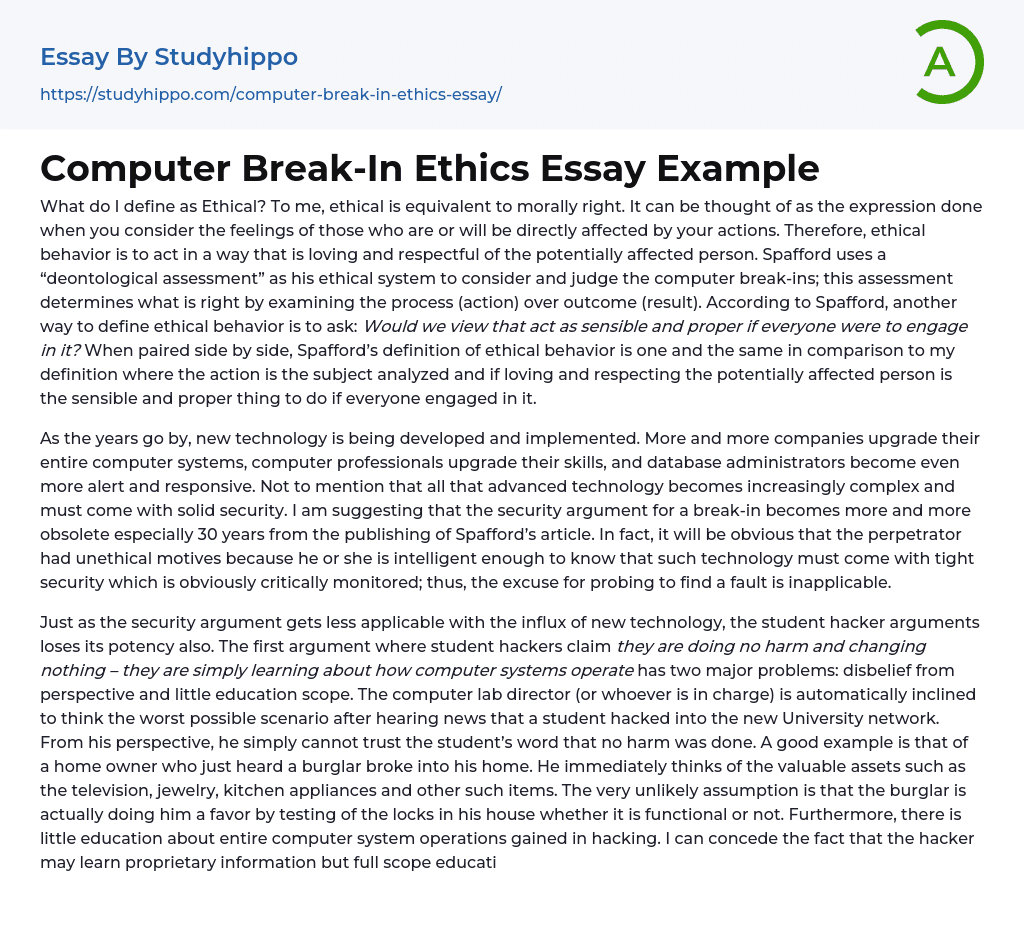To me, the meaning of ethical is being morally right and considering the feelings of those directly impacted by your actions. Acting ethically entails behaving lovingly and respectfully towards those affected. Spafford's "deontological assessment" evaluates computer break-ins based on the action itself rather than the outcome. Another way to define ethical behavior, according to Spafford, is to consider if it would be sensible and proper if everyone did it. Comparing both definitions, they align in focusing on analyzing the action and determining if it would be sensible and proper to love and respect those affected if everyone engaged in such behavior.
As time passes, there is a continuous development and implementation of new technology. Many companies are upgrading their entire computer systems, computer professionals are improving their skills, and database administrators are becoming more vigilant and responsive. Addition
...ally, the complexity of advanced technology is increasing, necessitating strong security measures. I propose that the argument for a break-in based on security becomes less relevant, especially 30 years after Spafford's article was published. It will become evident that the individual behind the break-in has unethical intentions because they possess enough intelligence to recognize the importance of tight security, which is being closely monitored. Therefore, the excuse for probing for vulnerabilities becomes irrelevant in this context.
The argument that student hackers are harmless and only seeking to learn about computer systems has two problems: the perspective of the computer lab director and the limited scope of education. The director is unlikely to trust the student's word that no harm was done, similar to a homeowner suspecting a burglar of taking valuable items. Hacking may provide some insight into proprietary information,
but it does not provide a comprehensive education on computer systems.The second argument made by student hackers is that computers are expensive and hacking provides a cost-effective way to further their education. This argument suggests that in modern society, where technology is costly, hacking offers a solution to obtain knowledge. However, this argument ultimately fails because hacking cannot provide a comprehensive and fundamental education, especially when dealing with complex systems in futuristic times.
The final argument presented by student hackers is that their creations, such as viruses, are intended to be harmless and are simply meant to help them learn how to write complex programs. This argument can be divided into two sub-arguments which I will analyze separately. Let's begin by examining the second sub-argument.
The second sub-argument claims that students are learning how to write complex programs in an era where computer systems are highly intricate. While this may seem convincing, the entire argument loses its strength when we consider the first sub-argument. The fact that a virus was intended to be harmless does not matter to any company, institution, or individual because the cost associated with restoring the system is expensive. The economic component of restoring system integrity for an already complicated system undermines the influence of this entire argument.
The argument that hackers break into systems to watch instances of data abuse and to help keep “Big Brother” at bay is a reasonable reason presented in Spafford's article. This argument becomes more credible in the future as data abuse by corporations and government agencies becomes more rampant. However, there are two flaws in this argument: first, it assumes that hackers can prevent data abuse
without engaging in network activities themselves; second, it fails to provide reassurance to individuals who entrust their sensitive information to unknown hackers. Despite these flaws, the argument of being a social protector is still relevant, especially in an age where even basic tasks like eating can be performed by robots.
- Perseverance essays
- Expressive essays
- Character Traits essays
- Apology essays
- Compassion essays
- Computer File essays
- Desktop Computer essays
- Servers essays
- Academia essays
- Higher Education essays
- Language Learning essays
- Studying Business essays
- Education System essays
- Study essays
- First Day of School essays
- Scholarship essays
- Pedagogy essays
- Curriculum essays
- Coursework essays
- Studying Abroad essays
- Philosophy of Education essays
- Purpose of Education essays
- Brainstorming essays
- Educational Goals essays
- Importance Of College Education essays
- Brown V Board of Education essays
- The Importance Of Higher Education essays
- Online Education Vs Traditional Education essays
- Academic And Career Goals essays
- Academic Integrity essays
- Brown Vs Board Of Education essays
- Distance learning essays
- Technology in Education essays
- Vocabulary essays
- Writing Experience essays
- Importance of Education essays
- Early Childhood Education essays
- Academic Degree essays
- Academic Dishonesty essays
- School Uniform essays
- Academic writing essays
- Cheating essays
- Bachelor's Degree essays
- MBA essays
- College Life essays
- Grade essays
- Diploma essays
- Phonology essays
- Sentence essays
- Filipino Language essays




